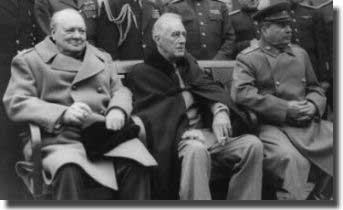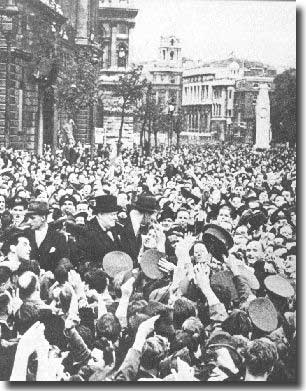|
Eight WW2 Leaders, a discussion about each of them
(work in progress)
It just so happened, that leaders from democratic countries who elect their parliament, or congress, namely Britain, France and the USA were very much in the minority when compared to all the other war time leaders who relied upon a dictatorship to remain, and bolster them in office. It is ironic that the democratic nations needed an alliance with the dictators Stalin, and in a much lesser role with Chiang Kai Shek, before they could achieve final victory over Italy, Germany, and Japan.
Eight Wartime Leaders in WW2. Great Britain. Winston Churchill. 1874-1965.
He took the seat of Oldham for the Conservatives in 1900, but switched to the Liberals in 1906. By 1911 Churchill had been appointed as the First Lord of the Admiralty, with the advent of WW1 he had activated the distastrous Dardenelles campaign and ships and lives were lost to such an extent, that his Prime Minister demoted him to the backwater job of Chancellor of the Duchy of Lancaster, a Minister without port foloio. With his star really on the wane, Churchill resigned from the Government, and on New Year's day 1916 he was appointed as a Lieutenant Colonel commanding a battalion in France, the 6th. Royal Scot Fusiliers. He had hoped he might get a brigade, but not so. But by July 1917, he was back in the government, as the Minister for Munitions. On to 1922, in the elections Churchill stood for the seat of Dundee, to be defeated and out of Parliament for the first time in 22 years. In 1924 he stood as an Independent, but was defeated by the Conservative candidate by a mere 43 votes. Later that year having once more embraced the Conservative party, he was elected as a Constitutionalist, and became the Chancellor of the Exchequer, the equivalent of Treasurer in our Federal Government. Churchill was some what of an opportunist when it came to politics, he swapped his allegiance several times, when it seemed he might advance his chances of a ministry or just to be elected. In the early thirties, to his credit, the lone voice of Winston Churchill could be heard in the Westminister Parliament, warning his colleagues of the dangers of a milititarised Germany, it was in 1933 that Adolf Hilter became the German Chancellor, thus bringing to an end, democracy in that country, Dictatorship now on the rampage. In 1936, we find Churchill counselling his King against marrying Mrs Simpson, alas to no avail, as King Edward the VIIIth. abdicated the throne to marry his American lover. I recall at that time, a Naval expression used to mark that event " Oh the Prince of Wales has become the third mate to an American Tramp !" By 1939 with war clouds darkening the skies of Europe, there were moves in the British Parliament by younger members to install Churchill into the Cabinet, but it was much resisted by Chamberlain and his older supporters. But when war was declared in September, after Poland was invaded, and Chamberlain shown up as being completely fooled by Hitler and his promises, WSC was recalled to the Admiralty as First Lord, a signal went out to all HM ships and Naval Bases, "Winston is back." In May of 1940 Chamberlain's government fell, and the King invited Churchill to form a Government, on the 10th. of May, he became PM, his time at last come. Churchill had this to say to the British public.
Here is the text of his famous speech " We shall fight them on the beaches."
Over the war Churchill never wavered, he nurtured the friendship between the US and his country, and after Pearl Harbor and the dastardly unprovoked attack by Japanese Carrier borne aircraft which catapulted the United States into the war, he knew victory in the long haul would come to the Allies. After VE day in May of 1945, he made these comments.
In June of 1945 Britain went to the polls, and although Winston had led them to victory a mood for change was in the air, Labour was voted into power with Clement Attlee as Prime Minister. Whilst Leader of the Opposition, Churchill devoted a great deal of time to writing his six volumes of WW2 history. Volume 1 The Gathering Storm was printed with 200,000 copies. I remember waiting with some impatience its arrival by sea in Australia, it cost 30 shillings, $3 in today's money, but of course one cannot just equate the cost then by contrasting it in dollar terms. What a bargain it was then. The Labour party was retained in office in the 1950 elections, but lost 78 seats, Churchill believed the tide was turning in his favour, and he was right, 1951 saw his party victorious. with the old war horse back in the saddle as PM. In 1953 the Queen made Churchill, a Knight of the Order of the Garter, the highest order of Knighthood in Britain. Later that year, Churchill was honoured by being awarded the Nobel prize for Literature. Churchill remained in Parliament until he was 89 and his last attendance was on the 7th. of July 1964, when Harold McMillan as PM was to say.
In the October elections of 1964, for the first time since Queen Victoria, Sir Winston did not place his name before the voters. He died the next year after a stroke on Sunday the 24th. of January, aged 90. At his funeral The Queen laid aside the usual precedence of the Monarch and entered the Cathedral ahead of the casket. Representatives of more than 110 nations were in attendance. The honorary pall bearers were: Field Marshal Sir Gerald Templer, Mr. Harold Macmillan, Lord Isrnay, Lord Normanbrook, Sir Robert Menzies, Lord Bridges, Field Marshal Viscount Slim, Marshal of the R.A.F. Viscount Portal of Hungerford, the Earl of Avon, Earl Attlee, Field Marshall Earl Alexander of Tunis and Admiral of the Fleet Earl Mountbatten of Burma. After the service the cortege travelled to Tower Pier, where the coffin was transported on the Port of London Authority launch Havengore for the journey up the Thames to Festival Pier. At Waterloo Station it was transfered to a train and, guarded by representatives of his old regiment, the Fourth Hussars, now called the Queen's Royal Irish Hussars, transported it to Lord Handborough Station. At the request of Lady Churchill, the committal service beside the graves of his a mother and father at St. Martin's Churchill at Bladon, was a family service. Only two wreaths were placed on the grave: "To My Darling Winston. Clemmie." and "From the Nation and Commonwealth. In grateful remembrance. Elizabeth R. 25th. Anniversary of the Battle of Britain.
Earlier in the day a Spitfire and Hurricane flew over the Churchill grave at Bladon. Conclusion. |

 Introduction.
Introduction.

